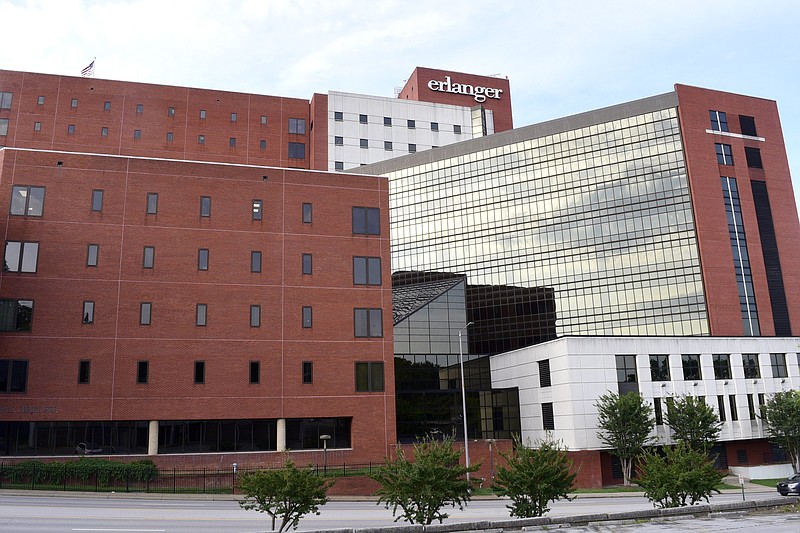The Erlanger Board of Trustees' decision last month to remove the hospital's chief of staff is drawing concern from physicians even outside the health system.
Fifteen physician leaders on the board of directors at the Chattanooga and Hamilton County Medical Society, which represents more than 1,000 area doctors in various practice settings with different hospital affiliations, last week sent a letter - obtained by the Times Free Press - to the trustees and Erlanger management, saying the relationship between the board and Erlanger's organized medical staff has "become the topic of enormous concern and conversation" among physicians throughout the community.
"Our board of directors includes a diverse group of physicians who are profoundly concerned about the perceived loss of autonomy of employed and independent medical staffs, compelling us to document our concerns," the letter states. "This situation is heightened because the physician in question is without a doubt one of the most widely respected physician leaders in the state and has voluntarily devoted his time and much of his career to the Erlanger Health System.
The relationship between a hospital's organized medical staff and its board is "critical for high-quality patient care," the letter states.
During an October board meeting, Erlanger trustees voted 6-3 to remove chief of staff and fellow trustee Dr. Chris Young, an anesthesiologist, from both his chief and board member roles over allegations he shared unspecified confidential information. Young is a past president of the Tennessee Medical Association and longtime advocate for Erlanger who's practiced there for more than 30 years.
He had spoken candidly about the challenges the public hospital faces in a PBS "Frontline" and NPR documentary on the financial pressures faced by American hospitals serving low-income and uninsured patients that aired in May.
Young told the medical staff he strongly disagrees with the board's process and decision in a letter sent to them after the October meeting, saying, "I never improperly disclosed information I possessed solely by virtue of my duties as a board member."
(READ MORE: Erlanger physicians still reeling over chief of staff removal)
A spokesperson for Erlanger board chair Jim Coleman said in an email that the board "responded immediately" to the medical society's concerns in a letter mailed on Nov. 24, which the spokesperson shared with the Times Free Press in response to questions about the medical society's letter.
"While distinct from the duty of a physician owed to their patients, each trustee has a legal and professional duty to [Erlanger] as a fiduciary. These duties require the board to investigate and act upon matters that come to their attention, and these same duties sometimes preclude the board from disclosing private information even to valued partners such as the medical staff (or anyone other than trustees and legal counsel)," the board's response letter states. "While the board did not expect to be in this unfortunate position, the board had an obligation to act in a manner consistent with these duties and in the best interests of the hospital."
The board's letter goes on to say, "the board acted carefully and diligently to fulfill these duties with the hospital's best interests in mind."
(READ MORE: Coleman selected to replace Mines as chair of Erlanger Board of Trustees)
Rae Bond, CEO of the medical society, said that "building a strong hospital takes a three-legged stool" - a strong organized medical staff, administration and board of trustees.
"It's important to maintain the balance," Bond said. "We're not aware of any similar occurrence happening anywhere in our region. We did hear from physicians throughout the community, including ones that aren't affiliated with Erlanger or other hospitals, with big concerns over the potential precedent this sets."
Erlanger is governed by an 11-member volunteer board. Six trustees are appointed by the county mayor with approval from the Hamilton County Commission, and the local legislative delegation appoints four trustees by a majority vote. The chief of staff, who is elected by the health system's medical staff, also serves as a trustee.
In addition to the trustee position, the chief of staff is chair of the medical executive committee - a group of top Erlanger physicians that includes the elected officers and chiefs of the hospital's 11 medical departments. The committee oversees key decisions related to medical staff policies and procedures, with an emphasis on patient safety and quality.
A major function of the medical executive committee is to provide checks and balances on the power of hospital administrators in a health care industry that can often incentivize leaders to value profits over patient care.
The medical society's letter states, "The leadership of the organized medical staff is self-governing, possessing special expertise and knowledge, and willingly accepting professional authority to regulate the professional practice and standards of the entire medical staff. The responsibilities are weighty, and those who willingly accept this role are unique and special leaders. The action taken by the board of trustees has the potential to create fear and distrust among the very physicians who are most critical to the success of every hospital and may lessen the physician voice in concerning ways."
The board's letter said trustees welcome the medical society's "continued feedback, collaboration and engagement," noting that Erlanger's medical staff is critical to the hospital's success.
Contact Elizabeth Fite at efite@timesfreepress.com or follow her on Twitter @ecfite.
